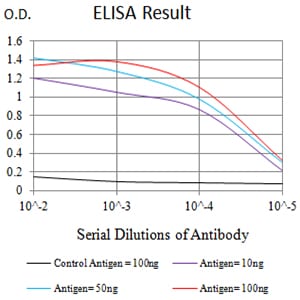CD134 Primary Antibody
Item Information
Catalog #
Size
Price
Description
The protein encoded by this gene is a member of the TNF-receptor superfamily. This receptor has been shown to activate NF-kappaB through its interaction with adaptor proteins TRAF2 and TRAF5. Knockout studies in mice suggested that this receptor promotes the expression of apoptosis inhibitors BCL2 and BCL2lL1/BCL2-XL, and thus suppresses apoptosis. The knockout studies also suggested the roles of this receptor in CD4+ T cell response, as well as in T cell-dependent B cell proliferation and differentiation.
Product Overview
Entrez GenelD
7293
Aliases
TNFRSF4; OX40; ACT35; IMD16; TXGP1L
Clone#
3G5G7
Host / Isotype
Mouse / IgG1
Species Reactivity
Human
Immunogen
Purified recombinant fragment of human CD134 (AA: extra 29-214) expressed in E. Coli.
Formulation
Purified antibody in PBS with 0.05% sodium azide
Storage
Store at 4°C short term. Aliquot and store at -20°C long term. Avoid freeze/thaw cycles.
Product Applications
WB (Western Blot)
1/500 - 1/2000
IHC_P(Immunohistochemistry)
1/200 - 1/1000
FCM (Flow Cytometry)
1/200 - 1/400
ELISA
1/10000
References
1.Oncotarget. 2015 Nov 10;6(35):37588-99.
2.Hepatology. 2014 Nov;60(5):1494-507.
2.Hepatology. 2014 Nov;60(5):1494-507.
Product Image
Elisa

Figure 1: Black line: Control Antigen (100 ng);Purple line: Antigen (10ng); Blue line: Antigen (50 ng); Red line:Antigen (100 ng)
Western Blot

Figure 2:Western blot analysis using CD134 mAb against human CD134 (AA: extra 29-214) recombinant protein. (Expected MW is 46 kDa)
Western Blot

Figure 3:Western blot analysis using CD134 mAb against HEK293 (1) and CD134 (AA: extra 29-214)-hIgGFc transfected HEK293 (2) cell lysate.
Flow cytometric

Figure 4:Flow cytometric analysis of HL-60 cells using CD134 mouse mAb (green) and negative control (red).
Flow cytometric

Figure 5:Flow cytometric analysis of Jurkat cells using CD134 mouse mAb (green) and negative control (red).
Immunohistochemical analysis

Figure 6:Immunohistochemical analysis of paraffin-embedded cervical cancer tissues using CD134 mouse mAb with DAB staining.
For Research Use Only. Not for use in diagnostic procedures.

